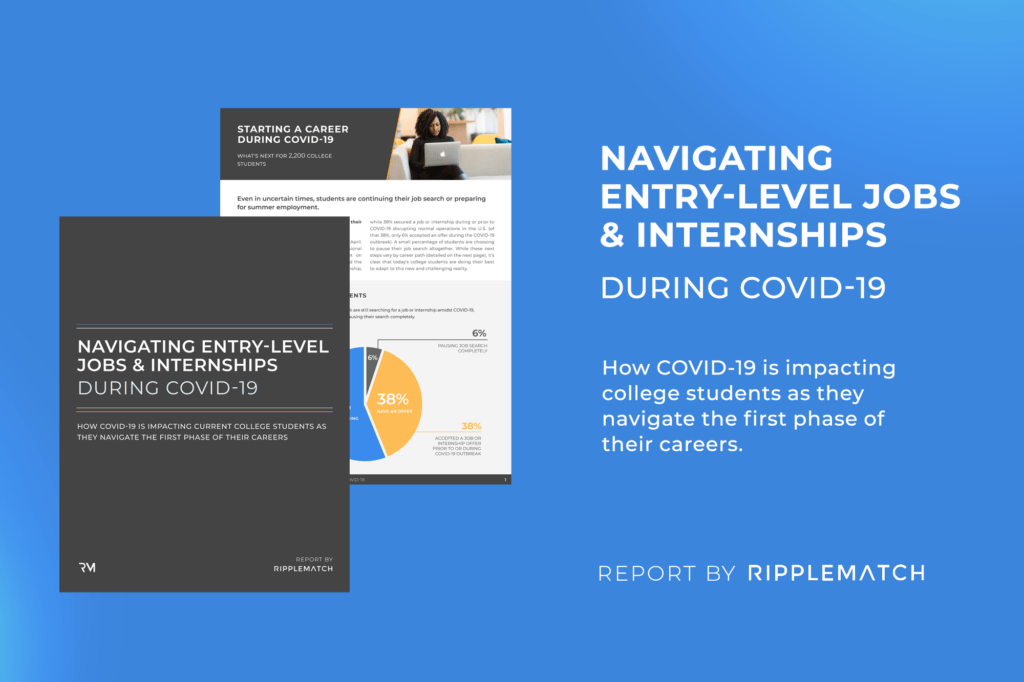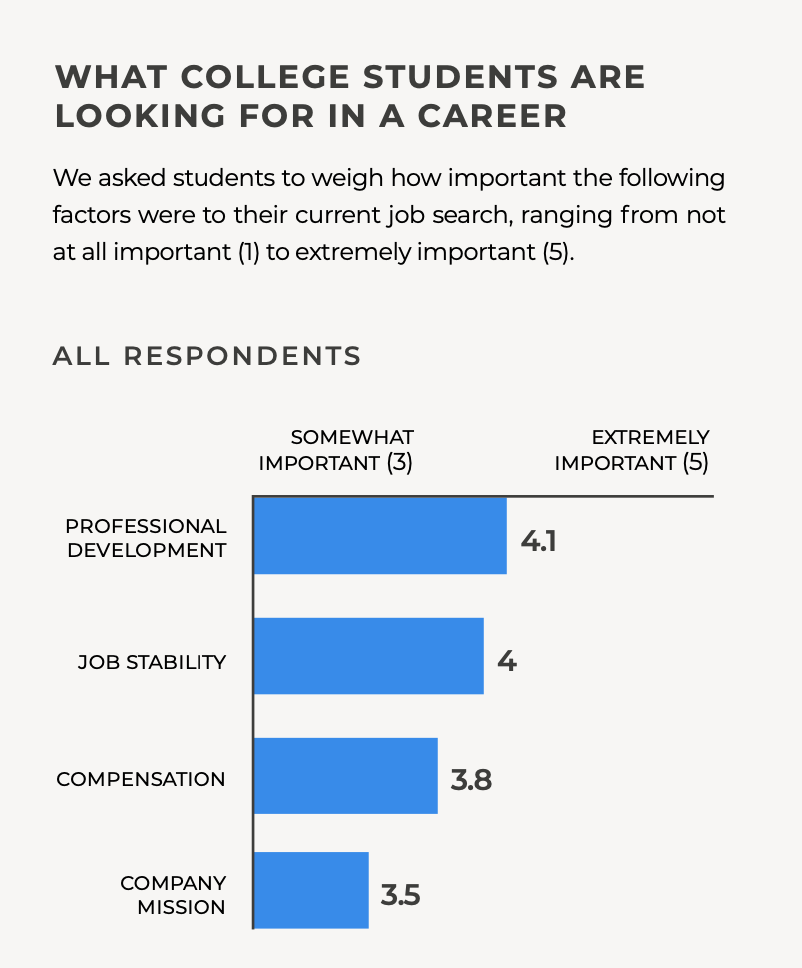For most college students, landing that first job or coveted internship is a stressful, but exciting, rite of passage. But the unfolding global health crisis has made taking that first step into a professional career significantly harder for millions of college students.
To understand how college students are navigating their job search and upcoming summer employment plans during COVID-19, RippleMatch conducted a comprehensive survey – the largest of its kind released so far – of 2,210 students who attended colleges and universities across the country. The complete findings, which include additional analysis by industry and qualitative student feedback, can be found in our report here; an abridged set of key facts and figures are below.
Overview: Key themes uncovered
When it comes to COVID-19, there’s a lot we don’t know – but our survey has uncovered some definitive themes that are shaping the early-career employment landscape right now.
For students, the most challenging part of finding a job during COVID-19 is knowing which companies are hiring.
The top challenge identified by student job seekers is the uncertainty surrounding company hiring status: 83% of students said that it’s difficult to tell which companies are actively hiring right now. 74% of student job seekers said ‘unresponsive companies’ was the biggest challenge in their current job search.
Student job seekers are open to career paths and industries they might not have considered prior to COVID-19.
Companies that are hiring interns and entry-level employees have an incentive to advertise their openings: 72% of respondents said they are applying to jobs outside of their preferred role type, and 68% are applying to jobs outside of their preferred industry. The challenging employment landscape means that many candidates are considering opportunities that they might not have previously considered, giving stable – but perhaps less widely known – industries the chance to stand out.
Most employers are honoring their commitments to entry-level hires and interns.
60% of programs are set to move forward despite complications from COVID-19. While around a quarter of respondents have yet to hear from employers about the status of their program, 16% of respondents reported that their job offer had been rescinded or internship program had been canceled. From the hard numbers to the qualitative feedback, it’s clear that most employers are committed to doing what’s right for their interns and incoming entry-level employees.
Read on for a closer look at the results of RippleMatch’s survey, and be sure to download the full report for a comprehensive look at the state of entry-level jobs and internships during COVID-19.
What’s Next for College Students Starting Their Career
Of the 2,210 students who took our survey in early April, 94% intend to move forward with their professional plans, despite significant complications brought on by COVID-19. Over half of students (56%) that completed the survey are still actively searching for a job or internship, while 38% secured a job or internship during or prior to COVID-19 disrupting normal operations in the U.S. (of that 38%, only 6% accepted an offer during the COVID-19 outbreak). A small percentage of students (6%) are choosing to pause their job search altogether. Of the 6% that decided to pause their search, half (51%) did so because they believe companies of interest are not currently hiring.
Navigating the Job Search
Overall, 56% of students surveyed are currently looking for internships or full-time jobs. Students pursuing a career in Design or Marketing/Communications were the most likely to be searching for a job, with 78% and 73% still searching for a job, respectively. Those pursuing a career in Finance were the least likely to be searching for a job, with only 27% reporting they are active in the job search.
Top Challenges
83% of the students searching for opportunities identified that their biggest challenge is figuring out which companies are still hiring amidst COVID-19. 74% of students said they are struggling with companies being unresponsive to their applications.
Career Preferences & Workplace Priorities
In addition to challenges, we wanted to know if students are adjusting their career preferences to increase their chances of finding a job. Our survey found that the majority of students are applying for jobs outside of their preferred role type and industry in an effort to land an opportunity. Unsurprisingly, students pursuing technical or specialized roles (such as software engineering or manufacturing) are less likely to branch out than those pursuing generalist roles such as consulting or analyst positions.
Additionally, we asked students about what they value in the workplace as they search for a job during COVID-19. Over years of research on the career priorities of Gen Z college students, we have consistently found that professional development is the top priority for most young professionals starting their careers.
Even in challenging times, this preference has stayed consistent. Students weighed professional development as the most important when searching for an opportunity, closely followed by job stability. Compensation ranked third at a 3.8 average, while company mission was at a 3.5 average.
Changes to Planned Jobs & Internships
Of the students who took our survey, 38% of students reported that they had accepted a job or internship prior to or during the COVID-19 outbreak.
Out of this share of respondents, 46% of students reported that their job or internship will move forward, but it will likely take place or begin remotely. 12% of students who had internship offers reported that they have been cancelled, whereas 4% students with secured entry-level jobs had their offers rescinded. 8% have been informed that their full-time role start date has been pushed back, while 6% of students have been notified that their internship will have a shortened program duration but that it will likely take place. While most students have heard back from their prospective employer, 24% of students have not received any communication from their prospective employer regarding the status of their job or internship.
Remote Jobs & Internships
We took a deeper dive to see which job types were moving remotely. 63% of students in Finance roles are moving to remote positions, followed by 57% of software engineering roles. Manufacturing roles were the least likely to move remotely, at 11%.
We also asked students how they felt about the shift to remote work compared to an in-person job or internship.
48% of students reported they are still excited about the opportunity, but are concerned about how working remotely will affect their experience. 21% of students claimed they are still excited about the opportunity and do not think the remote shift will hinder their experience, while 3% reported they are no longer excited about the opportunity. 28% felt that they are slightly less excited about the opportunity now that it will be removed to remote work.
The top three student concerns regarding remote work were: forming strong personal connections with managers or company leaders, lack of community amongst peers, and work performance not being as strong as compared to in-person.
Shorter Internships &
Delayed Full-Time Start Dates
As of early April, around 14% of students reported that their internship program would be shortened or that their full-time start would be delayed. We asked the students who selected this option to share more details about the altered timelines for their programs and job.
34% students who accepted jobs have not yet been informed of their new start date, while 38% say their start date has only been delayed by 1-2 months. 10% of students reported that their start date was pushed back by 3-4 months, while only 2% said it would be pushed back by 5 months or more. There’s slightly less uncertainty surrounding internship timelines than full-time start dates – only 16% of respondents said they had no idea how their program would be shortened. 84% of internship programs that have been shortened have had the number of weeks cut, rather than a shortened work day or shortened work week.
Lack of Communication from Employers
Of the 38% of students that accepted a job or internship offer, 24% are waiting to hear from their employers about concrete next steps or outcomes regarding their programs.
Most students (65%) are waiting to hear from their prospective employer before considering alternate plans, but close to 30% are already looking at jobs and internships in their preferred career path in case the opportunity does fall through. 15% of students are considering pursuing personal projects or starting a business, while a mere 8% are considering applying for temporary jobs that would be outside of their preferred career path, like essential retail personnel or food service.
Internship Cancellations & Job Offers Rescinded
12% of students who had internship offers reported that their programs have been cancelled. 38% of these students reported that their prospective employer made no additional actions beside notifying them of the canceled program. The top 3 actions taken by companies after canceling an internship program were:
- Prioritization for full-time roles in the upcoming year. 28% of companies informed the interns that they would be prioritized when interviewing for a full-time role.
- A spot in next year’s intern class. 18% of companies offered interns a spot in next year’s intern class.
- Offering an alternative experience. 13% of companies offered an alternative experience, such as workshops, 1-week immersive programs, etc.
4% students with secured entry-level jobs had their offers rescinded. Of those students, 28% reported that their former employers took no additional actions beside rescinding the offer. The top 3 actions taken by companies after rescinding an offer were:
- Offered to stay in touch about future roles. 68% of companies informed students that they would stay in touch about open positions in the future.
- Offered to make professional connections. 18% of companies offered to connect students with any other companies hiring.
- Offered financial stipends. 11% of companies offered financial stipends to students who had their offers rescinded.
Changes In Brand Perception
We asked all of the students who had accepted a job or internship offer how a company’s decisions regarding their employment status in light of COVID-19 affected their overall perception of the company.
Overall, 48% of students who were affected by the COVID-19 outbreak view the company in a more positive light based on how they handled the situation. 43% of students did not change their perception of the company, while 9% of respondents view the company in a more negative light because of how they handled the situation. Perception varied depending on what decision a company made, as well as how they handled the situation.
Employers that were proactive about communication and offered robust resources to aid students in next steps were viewed much more positively than companies who were sparse in their updates or provided little help after a decision was made. While this uncertain time is filled with difficult decisions, there were a number of companies that handled challenging circumstances with empathy and consideration – something that young professionals will remember as they progress through their careers.
Landing that first job or internship is more challenging than it was a year ago – but student job seekers shouldn’t lose hope. In challenging economic times, RippleMatch recognizes that it’s more important than ever to connect student job seekers with the right opportunities, and we’re committed to providing the resources for both students and employers to navigate the new challenges brought on by COVID-19.
Survey Methodology
RippleMatch surveyed 2,210 college students between April 6, 2020 and April 13, 2020. All survey respondents are confirmed users of RippleMatch and attended 367 unique colleges and universities. All respondents to this survey are slated to graduate between May 2020 and December 2021.


























